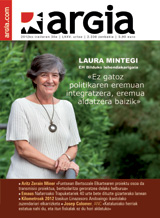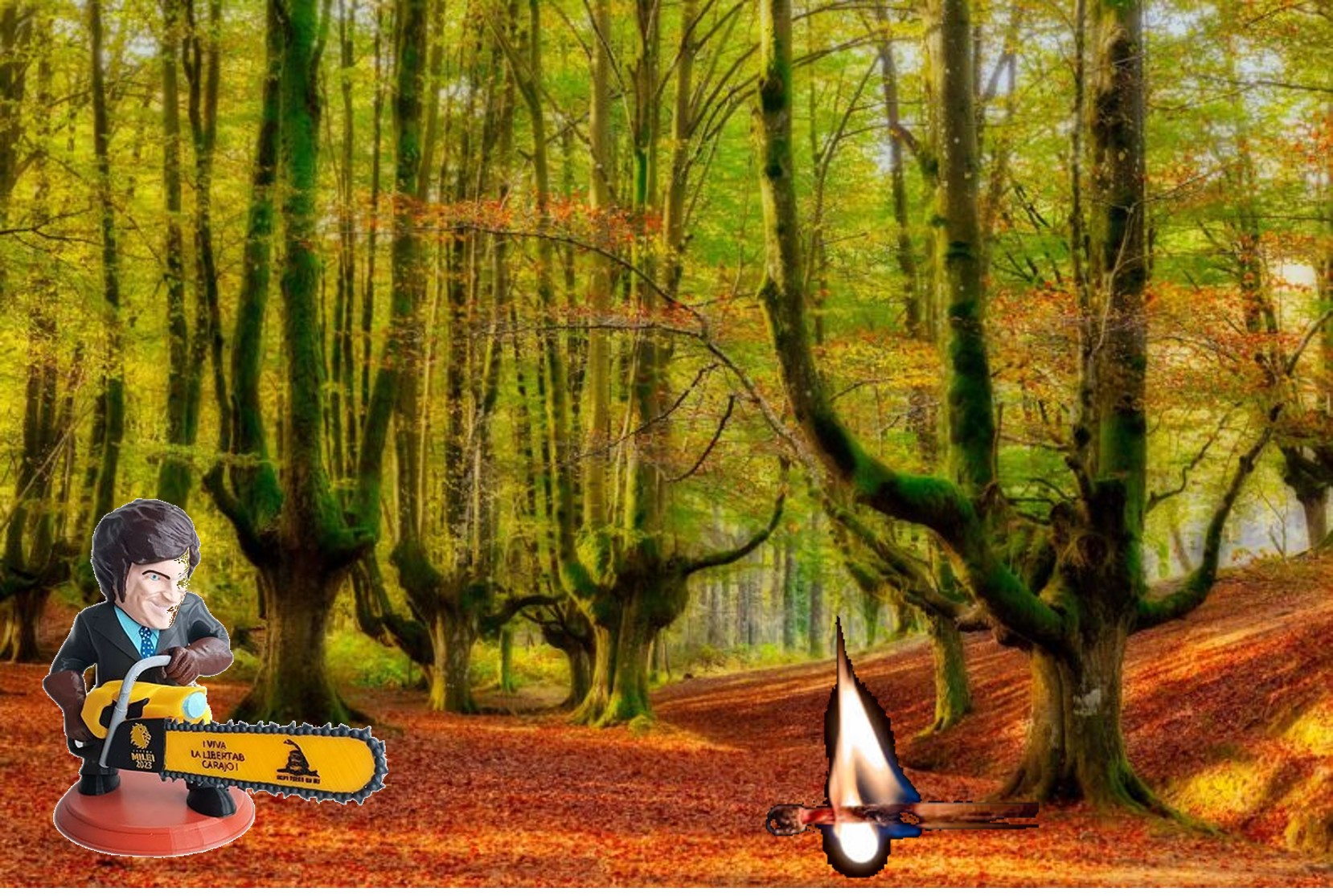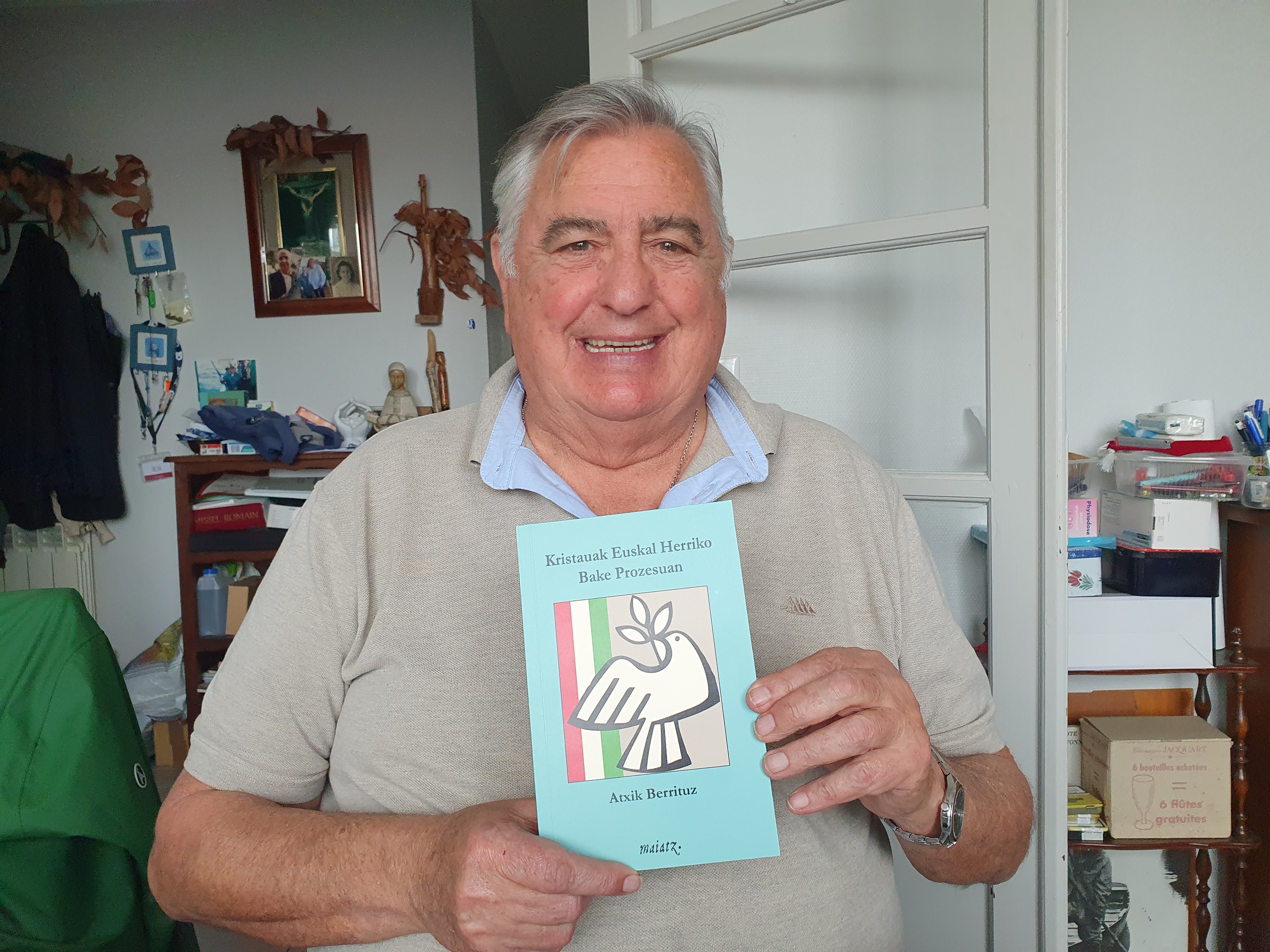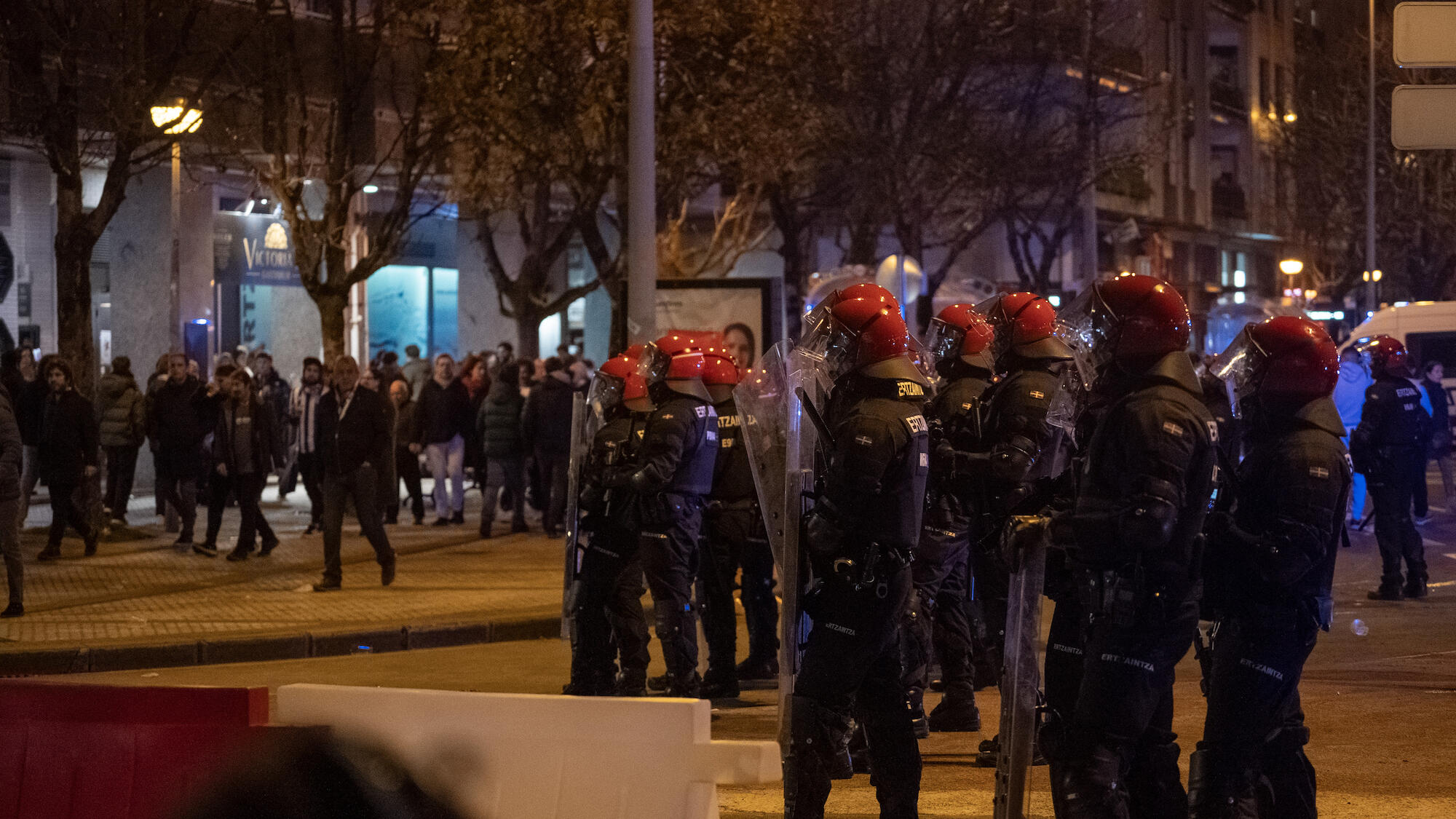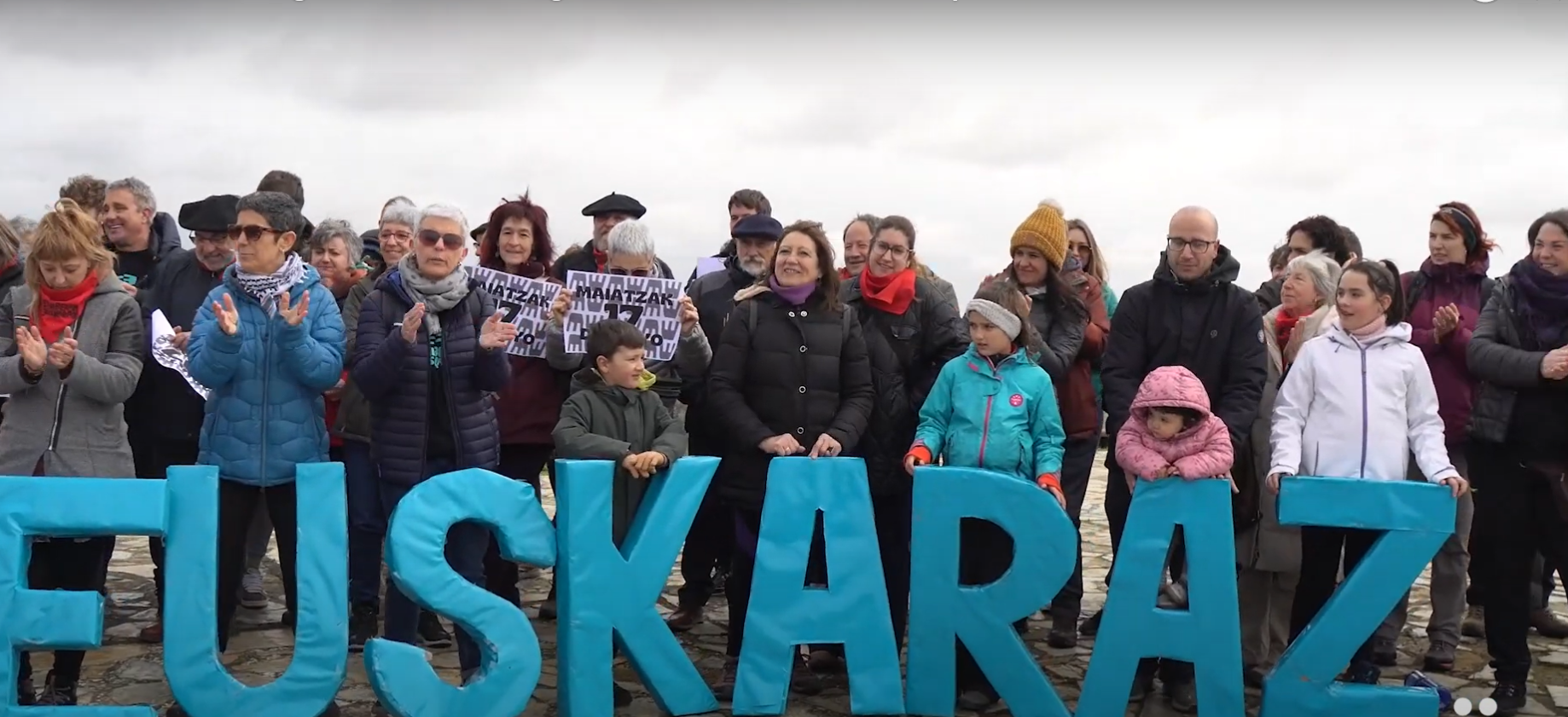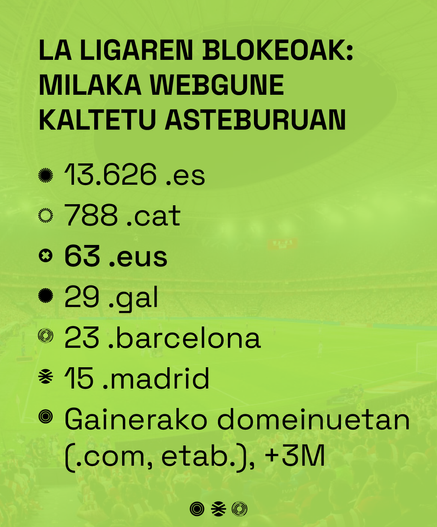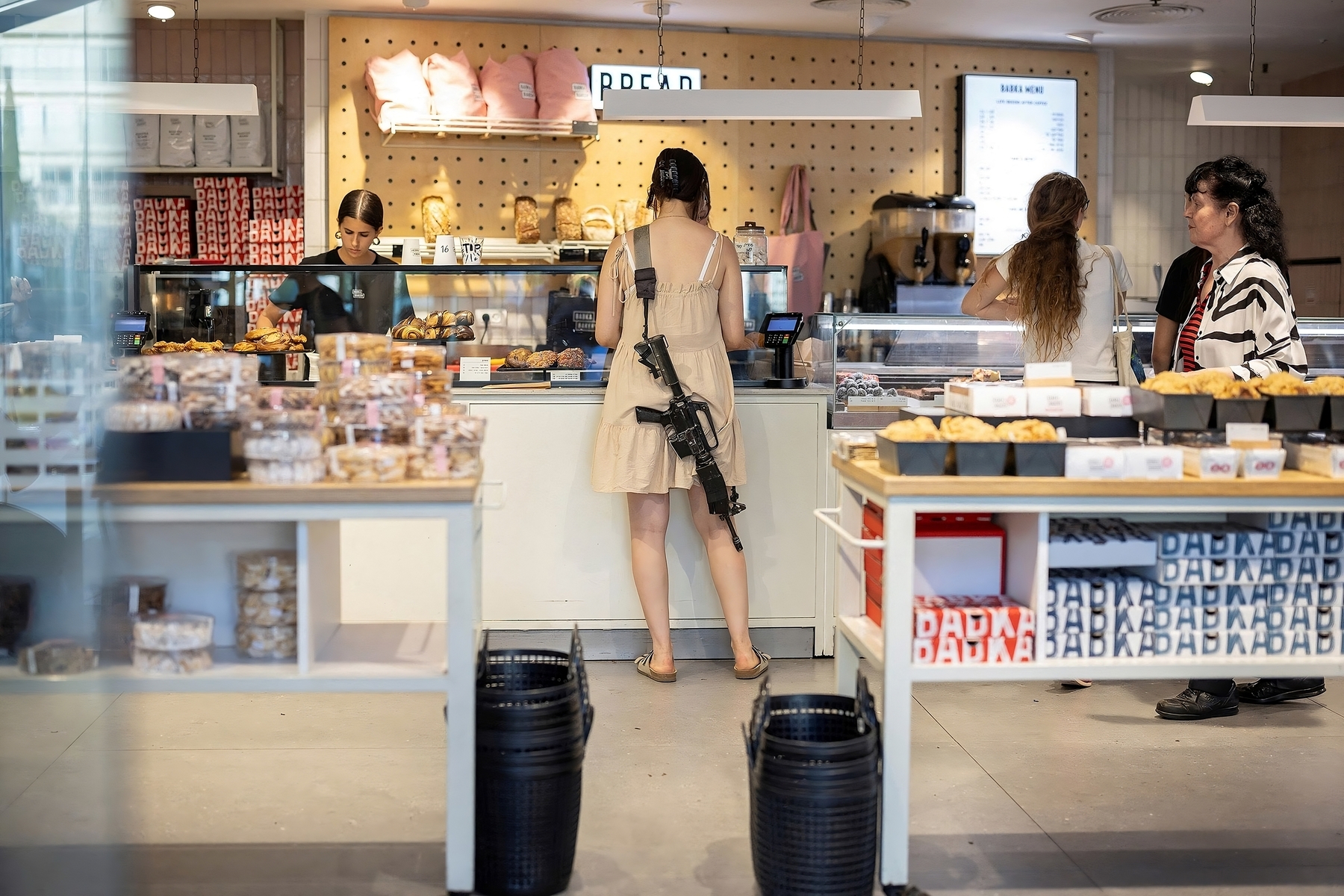Based on solidarity and lack of growth
- The Traperos de Emmaus de Navarra have been working on waste collection for 40 years. Among other things, more than 2,000 kilos of clothing a day are usually collected, which can reach 5,000 kilos on special days. Its aim is to combat the abuse of consumption and the lack of solidarity, as well as for a fairer society.
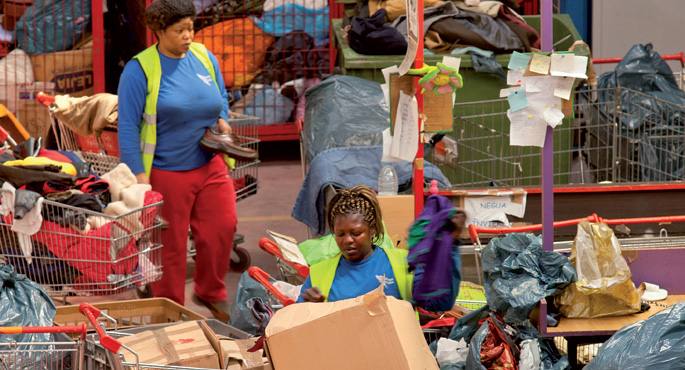
As soon as we open the door of the Emaus warehouse in Saratsa, we enter the world of the traperos. The ideas they defend and the objectives they pursue can be read on the walls: “Let’s work less so that we all have work” or “let’s be supportive”, for example. All employees wear blue t-shirt and pants, some even blue vest. They go from one side to the other collecting and abandoning things.
Amaia Olaverri and Marta Lacueva have explained their work to us and taught us the warehouse. On one side you can see hundreds of chairs, on the other several decorative elements of the churches, the clothes are placed in another space and the utensils of the house a little further away. Each worker is working in their space, separating the reusable from the unreusable. We have approached the corner where the utensils of the house are being repaired. The place is bright and there are two hard men working. One is repairing a furnace, the other is spinning around with television.
You can listen to animated music through the loudspeakers spread all over the warehouse. There is an optimistic environment and a good relationship between the two. People with very different religions, cultures and customs work together, reflecting the philosophy of the traperes: equality and solidarity.
Solidarity
Since its creation, solidarity has been one of the fundamental pillars of the smuggling work. They are a characteristic to enhance in daily life and this philosophy is the one that dominates in its activity as well. Distributing work, working less and hiring anyone without discrimination are some of the targets of the traffickers. Marta Lacueva says that her action well explains the following phrases: “Those who are seemingly incapable, with seemingly useless things, do useful things for society.” A few years ago, the traffickers decided to spend the day from 40 to 32 and a half hours, that is, six and a half hours a week, because in this way more people can work. In addition, they indicate that other activities can be carried out with the reduction of working hours. They insist that they will always give priority to working more people than to enriching a minority. Emaus is defined as Social Solidarity and want to demonstrate to society that a company can work differently.
All workers have the same contract, that is, they receive the same amount of money per hour of work. There are posts that ask for more hours, which charge proportionally; the maximum working hours is 37 hours. Thus, the director and the person who has just started work have the same salary, with the changes in the hours.
Olaverri and Lacueva think that being a trapuker has many advantages. In addition to working hours, Emaus offers them the possibility to carry out other activities to develop other values. One of these activities is the collective garden. A vegetable garden is made in the community, where twenty people come every month to make an auzolan, and in exchange for this work they receive a bag of products from the weekly vegetable garden.
Wages are not high and have other advantages to compensate for it. Among other options, they have the option to get free clothing and buy furniture and household items at a very low price. In addition, special doctors outside the Social Security system can save up to 50%, as half are paid by traffickers. In case you need money, Emaus allows employees to return it in the form and time they can.
Colleagues have pointed out that we live in an increasingly individualistic society, which limits the ability to influence as a group or a collective. They have added that, although society is supportive in many respects, usually with those who accompany us, that solidarity remains in nothing.
Responsible consumption
"Today, when I hear in some media that it is necessary to grow so that politicians get out of the crisis, it seems to me that they do not realize anything. Because I think you have to do the opposite, minimize it, grow, and you'll see how more people are going to have the opportunity to work," says Olaverri.Los traperos wager on growth. In Navarre, the Bira Beste Alde group works in favour of growth and it involves people from Emaus. The aim is to reduce consumption and distribute work, but the basis is to design a new society and create new businesses. In this new society, the path would be to meet people’s basic needs, to respect balance with nature and to live better with less. They think people should be a little more austere.
“It is true, however, that people in the area of Pamplona know very well the work of the traffickers, and before they throw things away, they throw them into the reuse containers,” says Olaverri. A large majority does so automatically, associates the collection of clothing or household utensils with the Emmaus trapers and stresses that there is a part of society very aware of the issue, which wants to respond to the waste they generate. Now, Lacueva makes it clear: “We would like people not to buy that much.” In this regard, he stressed that the amount of clothing they receive every day is barbaric.
In the current crisis situation, more and more people are approaching the Emmaus stores, but sales in general have not risen: “Our basic idea is to sell things at a low price, but it seems that people don’t buy as much as before, either first-hand or second-hand,” says Olaverri. Those who come closest are the people in difficulty, as well as the people who believe in another kind of life and who think about responsible consumption. The clothing is the most sold in the stores in Emmaus.
A day with traperos
The movement began at 8 a.m. in the industrial estate of Sarasa. Workers have started collecting or workshop work. The pick-up trucks have arrived at noon. With all that comes in, the selection process is carried out, that is, they are destined to the workshop for repairing reusable products, and those that cannot be repaired are recycled. The reusable material will then be sold in the clothing shops at a lower price, in the case of clothing between 3 and 6 euros, and the non-reusable material will be dismantled for further recycling.
Waste, in addition to being collected in households, is collected through the agreements they have with the communities. Their income is derived from agreements with the communities, which have an obligation to collect waste, for which they contract traffic. Only 10% of Emmaus Traperos’ revenue comes from subsidies.
Adapting to the new times
The traffickers intend to continue working for a fairer society, adapting to new situations. “The Foundation can have a promising future,” says Lacueva. 56% of the benefits come from the services provided to the communities and the Integrated Management Systems (GIS), 34% from the sale of objects and materials and 9.8% from the subsidy. As for last year’s data, over 10,000 tonnes of waste were collected in 2011, of which 86% was recovered. To cope with the economic crisis, traffickers see the importance and future of re-use and recovery clear.
They see themselves as a dynamic process, not as a process that has a beginning and an end. “In this process, we are the people at every moment who give color and life to this process. We are evolving, but we maintain the same initial ideology and we will adapt our ideas to the new reality that is generated every day,” they say. In short, they want to show the world that otherwise organized work is possible.
“Sufrimendu ororen aurrean, berehalakoan lagundu eta sufrimendu hori ekarri duten arrazoien aurka borroka egin ezazu”. 1949an Abbé Pierre frantziarraren esaldia da, bera izan zen Emausen sortzailea, eta ideia hori da urte hauetan guztietan fundazioak defendatu duena. 1949an sortu zen Frantzian trapuketarien lana. Nafarroako Emauseko Trapuketariak aldiz, 1972. urtean hasi zen lanean. Urte hartan, gazte talde batek “Emaguzue soberan duzuena” lelopean objektuak jasotzeari ekin zion eta Barañainen bizi ziren ijito portuges batzuei laguntzeko erabiltzen zuten lortutako dirua. Gerora, Santa Luzia herrixkan etxebizitza duinak egin ahal izateko ere balio izan zuten irabaziek.
Proiektu ugaritan hartu dute parte, urte hauetan. 1978an, Villa Simona izeneko etxea okupatu eta bertan hasi ziren trapuketarien bizitza soziala garatzen. Bizimodua taldean egiteaz gain, batera hasi ziren lan egiten. Pixkanaka hori ere aldatzen joan da eta gaur egun batzuek batera bizitzen jarraitzen duten arren, badaude komunitatetik kanpo bizi eta Emausen lan egiten dutenak ere. Villa Simonako etxea txiki geratu zenean, Beltzuntzen dagoen etxebizitzara aldatu ziren. Nafarroan 200 bat langile dira, eta horietatik 30 inguru bizi dira batera.
You may not know who Donald Berwick is, or why I mention him in the title of the article. The same is true, it is evident, for most of those who are participating in the current Health Pact. They don’t know what Berwick’s Triple Objective is, much less the Quadruple... [+]
The article La motosierra puede ser tentadora, written in recent days by the lawyer Larraitz Ugarte, has played an important role in a wide sector. It puts on the table some common situations within the public administration, including inefficiency, lack of responsibility and... [+]
Is it important to use a language correctly? To what extent is it so necessary to master grammar or to have a broad vocabulary? I’ve always heard the importance of language, but after thinking about it, I came to a conclusion. Thinking often involves this; reaching some... [+]
The other day I went to a place I hadn’t visited in a long time and I liked it so much. While I was there, I felt at ease and thought: this is my favorite place. Amulet, amulet, amulet; the word turns and turns on the way home. Curiosity led me to look for it in Elhuyar and it... [+]
Adolescents and young people, throughout their academic career, will receive guidance on everything and the profession for studies that will help them more than once. They should be offered guidance, as they are often full of doubts whenever they need to make important... [+]
Atxik Berrituz giristino taldeak Kristauak Euskal Herriko bake prozesuan liburua argitaratu du Maiatz argitaletxearekin. Giristinoek euskal bake prozesuan zer nolako engaiamendua ukan duten irakur daiteke, lekukotasunen bidez.
Maiatzaren 17an Erriberako lehenengo Euskararen Eguna eginen da Arguedasen, sortu berri den eta eskualdeko hamaika elkarte eta eragile biltzen dituen Erriberan Euskaraz sareak antolatuta
It will be two or three weeks since I read it, in a column by Maialen Akizu. Aner Peritz brought with him what he said on TV: “Bertsolarismo is what has led me not to interact with zis hetero men, because bertsolarismo is what has made me dissident, and also because... [+]







